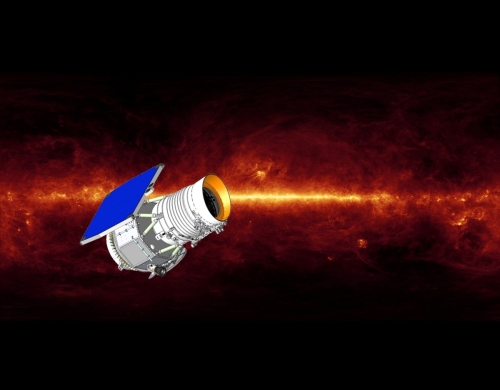LOS ANGELES (AP) -- If you're worried about a killer asteroid wiping out Earth, NASA has some good news.
The space agency said Thursday it has identified more than 90 percent of giant, potentially Earth-threatening asteroids, including ones as big as the one thought to have killed the dinosaurs eons ago.
 |
Artist's rendition of Wide-field Infrared Survey Explorer released Thursday by NASA/Jet Propulsion Laboratory. (NASA) |
``We know now where most of them are and where most of them are going. That really has reduced our risk'' of an impact, said Amy Mainzer of the NASA Jet Propulsion Laboratory.
NASA researchers also downgraded their estimate of the number of medium-sized asteroids, saying there are 44 percent fewer than previously believed. The downside is that scientists have yet to find many of these mid-sized asteroids, which could destroy a metropolitan city.
``Fewer does not mean none,'' Mainzer said. ``There are still tens of thousands out there that are left to find.''
The updated census comes from data from NASA's sky-mapping spacecraft named Wide-field Infrared Survey Explorer, or WISE, which launched in 2009 to seek out near-Earth objects, galaxies, stars and other cosmic targets.
Unlike previous sky surveys, WISE has sensitive instruments that can pick out both dark and light objects, allowing it to get the most accurate count yet of near-Earth asteroids. The spacecraft takes a small sample of asteroids of varying sizes and then estimates how large the population would be.
For the largest asteroids _ bigger than 3,300 feet (1,000 meters) across _ NASA said 911 of the 981 thought to exist have been found. None poses a threat to Earth in the near future, the space agency said.
Previous estimates put the number of medium-sized asteroids at 35,000, but WISE data indicate there are about 19,500 between 300 feet (91 meters) and 3,300 feet (1,000 meters)wide. Only about 5,200 have been found and scientists said there is still a lot of work left to identify the potentially hazardous ones.
Results were published in the Astrophysical Journal.
WISE is not equipped to detect the more than a million smallest asteroids that could cause damage if they impact Earth. The spacecraft recently ran out of coolant and is currently in hibernation.
<한글요약>
NASA, 지구와 충돌위험 소행성 90% 확인
미항공우주국(NASA)은 6천500만년 전 공룡을 멸종 시킨 것과 같은 규모의 것을 포함해 지구와 충돌할 가능성이 있는 대형 근거리 소행 성의 90%를 찾아냈다고 29일(현지시간) 발표했다.
NASA 제트추진연구소 과학자들은 "우리는 이들 소행성 대부분의 위치와 경로를 알고 있다. 이로써 충돌의 위험은 크게 줄었다"고 말했다.
이들은 또 대도시를 파괴할 위력을 가진 중간 크기 소행성의 수도 종전 예상보 다 44% 적은 것으로 나타났지만 이들 중 많은 것을 실제로 찾아내지 못했다고 밝혔 다.
NASA의 이런 연구 결과는 지난 2009년 근거리 천체들을 찾기 위해 발사된 WISE( 광역적외선탐사망원경)의 자료를 근거로 한 것이다.
WISE는 기존 우주 망원경과 달리 어두운 천체도 찾아낼 수 있으며 이렇게 발견 된 다양한 크기의 소행성 표본들을 근거로 전체 개수가 산출됐다.
NASA는 지름 1천m 이상의 대형 소행성 981개 중 911개가 발견됐으며 이 중 가까 운 장래에 지구를 위협할만한 것은 없다고 밝혔다.
한편 지름 91~1천m 사이의 중형 소행성은 이전까지 약 3만5천개로 추산됐으나 W ISE가 실제로 발견한 것은 5천200개에 불과하다. 과학자들은 위험 가능성이 있는 것 을 찾아내려면 많은 연구가 필요하다고 밝혔다.
이 연구는 천체물리학 저널에 발표됐다.








![[Today’s K-pop] Blackpink’s Jennie, Lisa invited to Coachella as solo acts](http://res.heraldm.com/phpwas/restmb_idxmake.php?idx=644&simg=/content/image/2024/11/21/20241121050099_0.jpg)